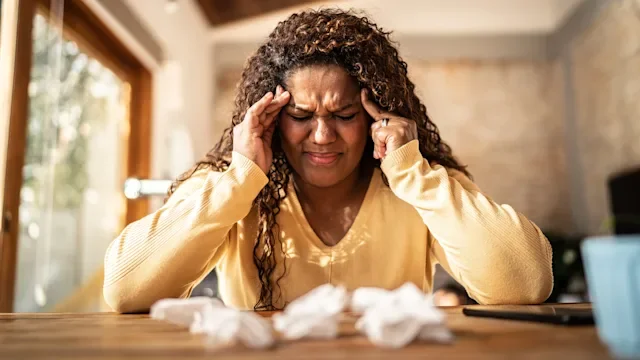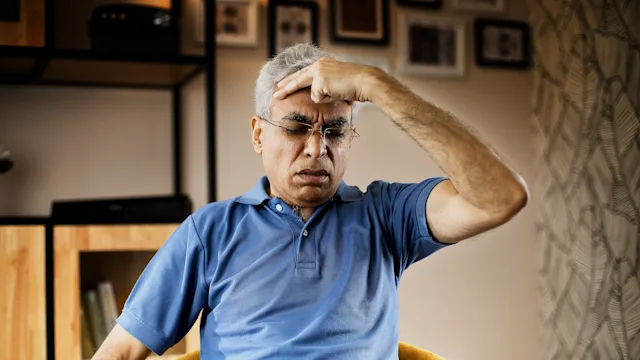Key takeaways:
Dehydration headaches happen when the body does not have enough fluids.
People who have had dehydration headaches say it feels like the front of your head is being squeezed.
Staying hydrated can help prevent these types of headaches.
There are a variety of reasons why you might get a headache. A common one is that your body is dehydrated.
Dehydration headaches can happen when your body doesn’t get enough fluids or when you don’t drink enough water. It can also happen when you lose more water than you’re taking in, like when you sweat from exercising and don’t replace the fluids. In these scenarios, you might feel dizzy, thirsty, or have a dry mouth.
Some people are more prone to dehydration headaches than others. Those who have experienced it say it can feel like a dull ache or a throbbing sensation. Here’s how three people who have experienced dehydration headaches describe it.
The dull ache of a dehydration headache
Michelle Krause, from Severna Park, Maryland, is an advanced orthopedic medical massage and craniosacral therapist. Previously, she worked as a firefighter. That’s when she first experienced dehydration headaches.
“We would be out on call, and I wouldn’t have a lot of ability to stay hydrated,” Michelle says.
She also gets allergy headaches from time to time, but a dehydration headache feels different, she says.

“Allergy headaches feel like a band around my head, but in my sinuses. Dehydration headaches are more focused in the frontal lobe,” Michelle says. “It feels like a dull aching. I also get a sensation in my skin, kind of like I need to grimace. It is like the skin in my face feels tense. The base of my skull and around my ear feel tense as well.”
When she got dehydration headaches as a firefighter, Michelle would sometimes drink Gatorade and take an over-the-counter pain reliever.
“That never seemed to help,” she says. “Most of the time, what really helped get rid of it was sleep.”
Now, Michelle tries to prevent dehydration headaches from happening in the first place. Her secret weapon is her homemade electrolyte drinks.
“Lemon water with Himalayan or Celtic salt helps prevent them,” she says, referring to dehydration headaches. “I drink that first thing in the morning. I aim for drinking at least 24 ounces. I find that to be incredibly beneficial.”
Michelle uses 1 teaspoon of Himalayan salt for 1 liter of water and adds the juice from one lemon.
Prevention is the best medicine
For Lynn Julian, a retired musician, author, and public speaker who lives in Boston, headaches have been a part of life since childhood.
She started getting migraines during puberty. But she had them under control as an adult, she says, until the 2013 Boston Marathon bombing, where she was a spectator. That event redefined her life.
She survived the terrorist attack, but she was left with a traumatic brain injury and permanent hearing loss. She also started having migraines again, about four times a week.

In the years since, she’s gotten her migraines back under control with the help of medication. But she knows not drinking enough water can trigger her dehydration headaches, which she describes as a different feeling than a migraine.
A dehydration headache “feels like a pressure headache that is sort of squeezing, and it’s all across the front of your head,” Lynn says. “There’s no aura with it.”
Lynn also says she usually gets dehydration headaches when she’s traveling and not drinking enough fluids.
“Prevention is the best medicine for a dehydration headache,” she says.
When choosing a drink to rehydrate with, Lynn looks for something with a sufficient sodium content. She also eats foods that are rehydrating, like watermelon and pears.
“Don’t just rely on water,” she says. “Eat foods that keep water in you, like fruits and vegetables, and not too many things that suck it out of you, like sugar.”
A brain squeeze
Erin Alton, a mortgage loan officer in Annapolis, Maryland, knows exactly what a dehydration headache feels like: a brain squeeze.
“What does it feel like? It feels like somebody’s trying to wring your brain out,” Erin says.

For Erin, a hangover can bring on a dehydration headache. “That’s why I don’t drink a lot,” she says.
She describes the feeling of a dehydration headache as being “like a dried-out sponge.”
“That’s what your brain feels like — a dried-out sponge,” she says. “And, as you start rehydrating, you can literally feel the pressure release.”
What does the doctor say?

Patricia Pinto-Garcia, MD, MPH
Medical Editor
Your brain controls all the sensations in your body, including pain. But, believe it or not, the brain itself doesn’t feel pain because it has no pain receptors. That’s why people can have brain surgery while they’re awake.
So if the brain can’t feel pain, why do people get headaches? Structures around the brain (like blood vessels and meninges) do have pain receptors and they’re particularly sensitive to any changes. It’s not clear exactly how dehydration causes headaches. But one theory is that fluid shifts from dehydration puts stress on the structures around your brain, causing headaches. People may feel pain on the back, front, or sides of their head depending on which structures are being stressed.
People who have headache conditions, like migraines or tension headaches, are more likely to develop headaches when they’re dehydrated. Dehydration is also a known trigger for migraines and tension headaches. That means people who are prone to headaches can get doubly hit when they’re dehydrated.
When it’s a hot day or you’re going to be more active, make sure to drink enough fluids to stay hydrated. It will keep you feeling better and lower your risk of getting headaches.

Why trust our experts?

















